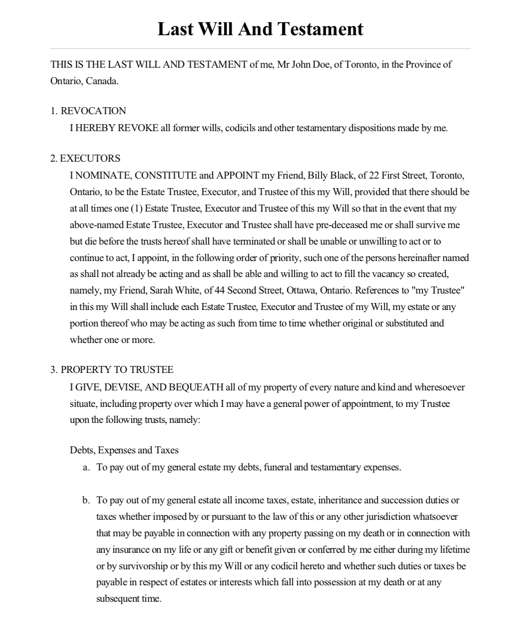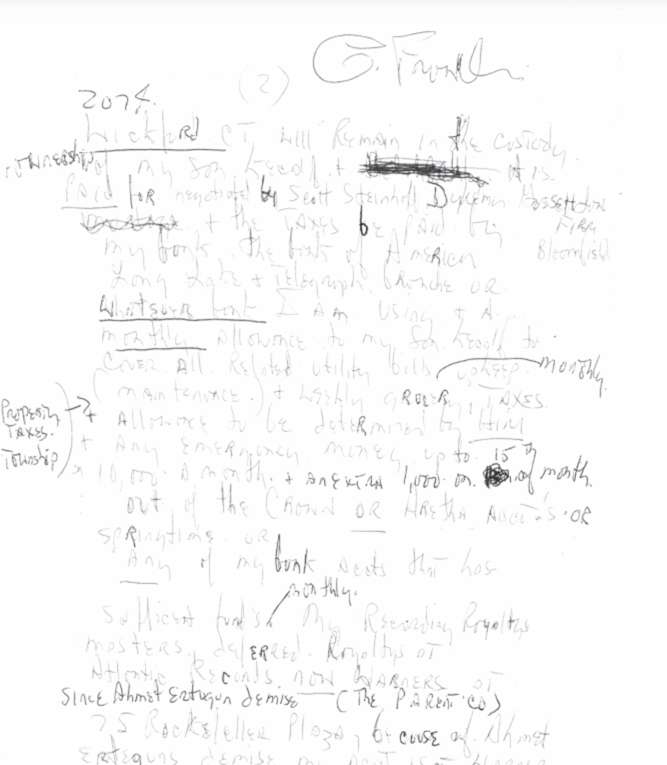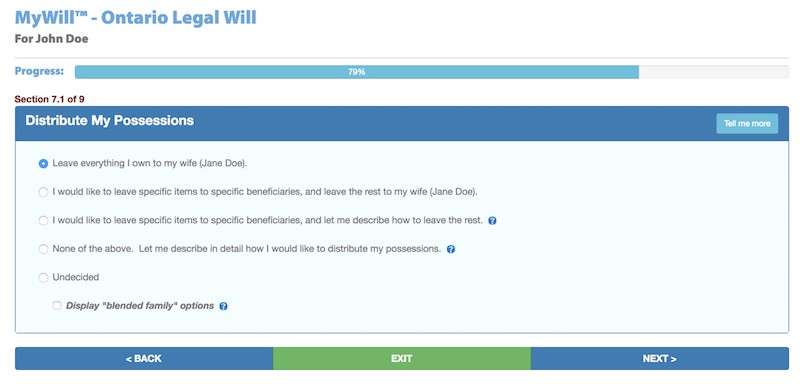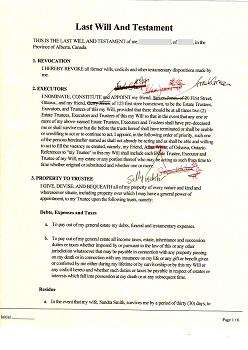Do you have a Will already? you just need to make a slight change to it? Perhaps you had a lawyer prepare your Will for several hundreds of dollars you don’t want that money to go to waste, but now you need to update it. After doing some research, you have determined that a codicil is what you need.
Let us explain exactly what a codicil is, and why it’s probably not the solution you are looking for.

The origins of a Codicil
The first step in understanding the role of a codicil is to look at the history of the law related to Wills. In Canada, Estate planning laws were based on the UK Wills Act (except for the Province of Quebec). This law was written in 1837, and surprisingly, not too much has changed in the last 180 plus years.
In 1837, if you wanted to write a Will it would have looked like this

Imagine, a week after you had gone to the trouble of having your Will prepared, you wanted to make a change. The Will writer wouldn’t have wanted to rewrite the whole document, so the Wills Act made a provision for a codicil. It’s a “middle English” word meaning “little codex”, or according to Mirriam-Webster “a little bit of writing on a small piece of writing material, used to add to or change something about a larger piece of writing.”
The Typewritten Will
It was a half a century after the Wills Act was written, that the first commercial typewriter become available. This sped up the process of writing a Will, but updating a Will was still painful, and so even after the advent of the typewritten Will, a Will writer would still have relied on a codicil to make any minor modification. It would save them the effort of re-typing the whole document.

What exactly is a codicil?
A Last Will and Testament is usually about 5 or 6 pages, made up of a number of clauses (numbered paragraphs). Each clause covers a certain element of the Will, for example, appointing an Executor, directing a bequest to a beneficiary, naming a guardian.

A codicil is a document that makes reference to that Last Will and Testament, stating for example, that for clause 2 “Executors” instead of naming Billy Black as the Executor, the Will should now read, Robert White as the Executor.
How to make a codicil a legal document
Here’s the problem with a codicil. It has the exact same signing requirements as a Will. The codicil must be signed in the presence of any two adult witnesses who are not beneficiaries in the Will (or in some Provinces, the witnesses cannot be married to a beneficiary).
So there is not much time saving when it comes to making a codicil an official legal document.
Handwritten changes to a Will
If a codicil sounds like a hassle, you may be tempted to just handwrite some annotations to a Will. This is what Aretha Franklin did. She not only wrote her entire Will by hand (in fact, she wrote three), but she freely annotated the documents to reflect any changes of her intentions (yes, below is her actual Last Will and Testament).

Needless to say, this is a complete disaster.
But even if you had the neatest handwriting and wanted to make some handwritten changes to a typed Will. You would still need to initial those changes, and you would still need two witnesses to initial those changes. So again, you are not saving much time (although if you wrote your Will with a lawyer, you may be saving some money by doing some handwritten changes instead of returning to the lawyer).
What can’t a codicil do?
We still see unqualified bloggers researching Wills, and finding some information about codicils. They then recommend codicils as a shortcut to updating your Will. In this article the author suggests
You may have an additional member in your family after you wrote the original will. You could write a new will and discard the older version. But the process is not easy when our Wills are long. But there is help at hand. You can amend your earlier will. Such an amendment is called a codicil.
Let us think about this. You now have an additional member of the family, presumably a young child. You would need to insert them into your distribution plan, also creating an alternate plan in case they pre-deceased you. You would need to name a guardian for that child, and set up a minor trust so that you can determine the ages that they would receive their inheritance.
A new member of the family is a terrible use-case for a codicil. A codicil should only ever be used for simple things like changing an appointment (the Executor or Guardian) or perhaps adding a bequest.
Why a codicil no longer serves a purpose
We now live in an age of computers and printers. Even if you prepare your Will with a lawyer, they will probably use software to generate the final document. They enter your information into the system, and a Will is created. Most commercial software packages allow the lawyer to save your details, so that they can login at a future time, find your account and easily make an update.
If you return to the same lawyer that wrote your original Will, it is actually faster for that lawyer to write a new Will compared to preparing a codicil.
If you go to a new lawyer, with an existing Will, they would probably suggest that you prepare a new Will rather than try to adapt your existing Will with a codicil. They would want to review all of the elements in your existing Will to make sure that it still reflects your situation.
This is why lawyers typically charge several hundreds of dollars for updating a Will. It is typically just as complicated as preparing a brand new Will.
Sadly, this leaves many people with an out-of-date Will. A recent survey conducted by LegalWills.ca revealed that one in five Canadians over the age of 65 had an out-of-date Will. This is made even more shocking when that same survey revealed that one in three Canadians over the age of 65 didn’t have a Will at all.
Confusing codicils
Now that we’ve established that there is no time-saving in preparing a codicil, it’s worth exploring why they are generally a bad approach to updating your Will. After all, they were invented as a work-around back in the day when Wills were all handwritten.
Supposing you have a few changes that you want to make to your Will. You may wish to add a charitable bequest, change the name of your child’s guardian, and modify the age at which your child will receive their inheritance.
A codicil can in theory do all of this for you.
But imagine at a later date you want to add another charitable bequest, and remove the name of the guardian. You could then write an additional codicil that would make reference both to the existing Will, and also make reference to your first codicil.
Does the new codicil seek to remove the charitable bequest that was included in the first codicil? or would this new bequest be in addition to the bequest listed in the first codicil.
Your codicils can very quickly become very confusing.
Writing a Will using a service like LegalWills.ca
An increasing number of people are attracted to the convenience of preparing their Will using an online service. At www.legalwills.ca you can prepare a Will in about 20 minutes for $39.95.
Our Will writing service steps you through the process for preparing your Will in ten sections. You make key appointments, describe the distribution of your estate, including any charitable bequests. If applicable it also allows you to set up minor trusts and name guardians. We even have a section for charitable bequests and pet trusts.

Online services certainly are more convenient for creating a Last Will and Testament. But they are particularly attractive every time you want to update your Will.
You can access your account at LegalWills.ca from anywhere in the World, from a phone, iPad or computer, with your User ID and Password.

Options for updating your Will today
If you have an existing Will, but need to make a change, there are three options for updating your Will;
- Make a handwritten annotation on the Will.
Generally this is not recommended because there will always be doubts surrounding which changes were made when. If the change makes a significant change to the distribution of the estate, there is a high likelihood of the Will being challenged. Although it can potentially save money, it will not save any time because the annotated changes still have to be witnessed by two independent witnesses. Don’t do this to an existing Will. - Write a codicil.
Making reference to the existing Will, you prepare a new document with the title “Codicil to a Will” that makes reference to the existing Last Will and Testament, and describes a change to a specific clause in that Will. It describes the exact clause, and explains that the clause should change, with the new wording. Again, this document must be signed in the presence of two witnesses. - Prepare a new Will.
This may seem to be the most difficult approach to making a change to a Will, but it ensures that your Will is correctly written, and actually doesn’t take much more time and effort than the other options.
Updating your Will at LegalWills.ca
Supposing you have a Last Will and Testament in place, but you have been inspired by the work of a particular charity. They have explained to you how important “planned giving” is to them. Planned giving is when you leave a bequest to a charity in your Will.
You realize that leaving just one percent of your estate will not make much difference to your beneficiaries, and will make no difference to you personally, but it can make a significant impact on the work of the charity.
If you have previously written your Will with LegalWills.ca, you would simply login to your account, and click on MyWill.
You would choose to “modify your Will” and then jump to section 7 “distribute your possesssions”. Then navigate to the section on charitable bequests

You then click Save, download and print your Will, and then sign it in the presence of two witnesses.
The whole process would take about 5 minutes, and if you have an active account with us, it would cost absolutely nothing.
Writing a Will is not a once in a lifetime task.
We know that most Canadian adults do not have a Will. It is a task that many of us procrastinate over. We even hear from people who claim that “I don’t need a Will yet“.
Will writing has traditionally been an expensive and inconvenient process. Updating a Will with a lawyer is equally expensive and inconvenient. As a result many people look for that perfect time in their lives when the Will can be written and never updated.
It is common for people to plan to write their Will after an important milestone; after they get married, buy a house, have a child, accumulate assets, or simply get old.
This is a mistake. A Will should be written as soon as you are an adult, and updated throughout your life as your circumstances change.
A Will should also be updated any time somebody named in the Will has a change in circumstance. For example, a beneficiary may come into some money, your guardians may move to Australia, your Executor could be taken ill. There are countless reasons for updating a Will beyond the obvious marriage, divorce and having children.
Write your Will today
You shouldn’t put off writing a Will simply because it may need updating at some time in the future. The reality is that your Will could be out-of-date tomorrow if somebody named in the document is in an accident. There is nothing you can do about this.
Don’t be afraid of the need to update your Will. Write your Will today, and update it whenever you need to. Using a service like LegalWills.ca, we make this easy. Without the need for a codicil.
- Probate in Canada – What it is, what it costs, how to reduce fees. - January 6, 2025
- All about Trusts – how to include a Trust in your Will - June 9, 2022
- The Holographic Will – what is it and when should you use one? - May 18, 2022













